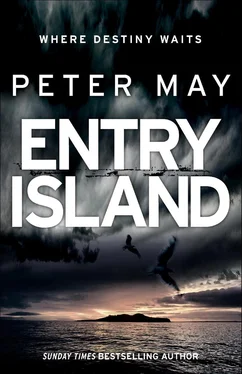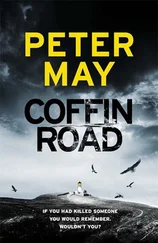Sime leaned over him to try to catch a glimpse. And there they were, standing out in sharp relief against the flow of dark water in the St Lawrence. Grey rock and fall foliage. Nine or ten of them, varying in size, stretched out along the course of the St Lawrence to the north-east of the city.
‘Third one up from the Île d’Orléans,’ Blanc said. ‘That’s Grosse Île. That’s where they had the quarantine station for immigrants in the nineteenth and early twentieth centuries. You ever hear about it?’
Sime nodded grimly. ‘Yes.’
‘Poor bastards. It was sheer hell, they say.’
And Sime’s recollection of his ancestor’s experience there came flooding back.
This voyage is a nightmare beyond anything I might ever have imagined. And it has only just begun! God only knows what miseries lie ahead.
I have learned not to think about Ciorstaidh, for it brings only pain and increases my depression. Had she been aboard with me as planned, we would have been in one of the few passenger cabins above deck. She had our papers, and when it was discovered that I had none, and no proof that my passage had been paid for, I was told by the first mate that I would have to pay my way, and was assigned to the kitchen to cook for the passengers below deck, among whom I would have to find a place.
The kitchen is really just a crude preparation area, and the three of us designated as cooks find it almost impossible to work when the seas are rough, as they have been since we left.
The drinking water in the barrels provided is green. Almost undrinkable. And half the grain in the sacks is mouldy. There is precious little in the way of meat, and it won’t keep long anyway. I have no idea how we are going to eke out the potatoes and onions and turnips for the length of the journey.
I have learned that most of the 269 folk in steerage are from the Isle of Skye. Cleared from their land and sent to Glasgow by their landlord, who has paid their passage to Canada. Most of them possess no more than they stand up in. They have no money, and no idea what will happen to them when they arrive at their destination.
The Eliza was never intended as a passenger vessel. She is a cargo ship. She will return to the British Isles laden with goods from the New World, and the people in steerage on the way out are little more than paying ballast.
What they call steerage is a cargo hold crudely adapted to take people. Stalls have been constructed along each side of the hull, and down the centre of the ship. The stalls are on two levels, squeezed between the upper and lower decks. They provide little more room on filthy, stained planking than you can lie down on.
Families are squeezed in, eight or ten to a stall. There are no toilets. Just tin chanties that you have to carry, sloshing and spilling, up to the top deck to empty overboard. The air is thick with the stench of human waste and there is no water for washing.
Neither is there privacy when you perform your toilet. Which is embarrassing for everyone, but for the women in particular. Most use blankets held up by family members to screen them.
It is dark down here, and oppressive. In bad weather they batten down the hatches and we see no daylight for days on end. The only illumination comes from the oil lamps that swing overhead, releasing their fumes into already unbreathable air. There are times I cannot even see to write this account of my life, and when the boat yaws and pitches in a storm I am inclined to think that no one will ever get to read it. I have been fortunate to be taken under the wing of the captain’s wife, as almost the only passenger in steerage who speaks English. She has provided me with materials to write my journal and a place to keep it safe. The writing of it is the only thing that keeps my sanity intact during these interminable hours and days.
The seasickness is bad, and the music of human misery that I am now used to hearing day and night is almost constantly punctuated by the sound of vomiting. I often think of my mother and sisters aboard the Heather , and how it must be for them, too. It is a thought I can hardly bear.
There is another sickness as well. Not caused by the motion of the boat, but by some malady. There is one man, I have noticed, who seems sicker than the rest. A young man, fit and strong, maybe five or six years older than myself. His name is John Angus Macdonald, and he has two young children and a wife pregnant with a third. He has violent sickness and diarrhoea and has not eaten for two days now. And just tonight I noticed an eruption of red spots on his chest and abdomen.
We have been at sea for two weeks, and John Angus Macdonald is dead. He and his family were in the stall next to mine and I watched him wither in front of my eyes.
We held a brief funeral service for him this morning. Just a handful of us allowed up on deck for the ceremony. I cannot describe how wonderful it was to breathe fresh air, although in the end it only made it harder to return below deck.
John Angus was wrapped in the sheet he died in. Crudely sewn into it. I was only there because I am one of the few aboard who can read and write, and someone thrust the Gaelic bible in my hand and asked me to read from it. I remembered the passage old blind Calum had recited over my father’s coffin. Although it took some time, I found it eventually: John, chapter 11, verse 25. I am the resurrection and the life, saith the Lord: he that believeth in me, though he were dead, yet shall he live; and whosoever liveth and believeth in me, shall never die .
And they slid his body over the rail. I saw the tiny splash it made in heaving seas, and realised, possibly for the first time in my life, how utterly insignificant we all are.
I have no idea how many weeks his widow Catriona’s pregnancy has left to run, but her bulge is substantial, and it cannot be too long before she will give birth. A baby that will never know its father.
Somehow I feel a responsibility for her now that her man is gone. I am right there in the next stall, and the closest thing to a father her children have. Even as I write this by the feeble light down here, the little boy and girl are curled up at my legs, sharing my sheet now that their father’s is gone. All that I can really do for them is try to make sure they each get a little extra food.
The weather continues to be abominable. The hatches have been shut for days to keep the weather out, and I feel that I could cut the air into slices with my knife.
I spoke earlier today with a member of crew who told me the average sailing time is normally four to six weeks. But because of this weather we are already well behind schedule, and he thinks it could take up to two months. I took an immediate inventory of our larder, such as it is, and did a quick reckoning. It seems to me that we will run out of food and water long before we get to our destination.
John Angus Macdonald’s sickness has spread. Eleven people have now died and been dropped overboard. Many of my fellow passengers have relentless diarrhoea. It soils the boards we sleep on. It makes a porridge along with vomit to render the floorboards treacherous underfoot. We have no way of cleaning it up, and the stink is beyond unbearable.
I am acutely aware of the symptoms of the sickness that stalks us in steerage, and watch keenly for any sign of it in myself. Thus far I have been spared the malady, but not the misery.
Tonight has been one of the most distressing of my life.
Catrìona Macdonald finally went into labour. The ship was pitching violently, and shadows cast by the swinging oil lamps danced among us like demons. It was well nigh impossible to see or focus clearly.
The poor woman was in terrible distress, and the more experienced older women gathered round to help with the delivery. Catrìona’s screams rose above even the roar of the storm, and her terrified children clung to me in the stall next door.
Читать дальше












